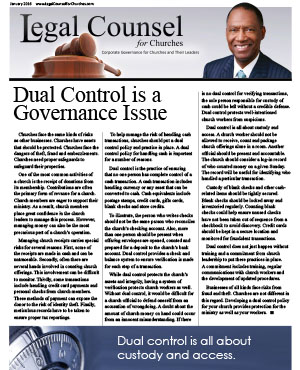Many organizations have a written contract with their chief executive officer. The agreement sets forth the terms of employment and establishes a common understanding of the position description. There are many benefits to having a written employment contract.
One of the most important duties of a presiding church board is coming to an agreement with the pastor on employment issues. Employment concerns may include compensation, benefits, retirement, performance expectations and length of the engagement. Employment becomes more complex for church pastors due to unique tax treatments, free religion rights and doctrinal philosophies.
Some churches hire the pastor on a handshake. These churches may feel that the absence of an agreement gives the church more leeway in an at-will employment status. Perhaps. If the pastor performs to expectations and there are no disagreements with the church, no harm may come from this informality. Unfortunately, if a mix-up arises, the absence of a written agreement may handicap both parties in seeking a solution.
Other churches may feel that the details of a pastor’s employment agreement could wind up in the wrong hands. If the contract were to be made public, some fear other church employees might protest. An even greater panic is church members might balk at the terms for a pastor contract if widely disclosed.
There is a good reason to put pastors’ agreements in writing. The pastor is usually the highest compensated executive at the church. For this reason, there is usually curiosity around what promises were made. A written contract ensures everyone is on the same page with what’s expected. Furthermore, church officials occasionally change positions. A pastor that serves under different governing administrators needs the assurances that the church will honor the deal made. An incoming church official needs a properly executed document to know what terms have been reached with the pastor.
A pastor need not be a new employee to negotiate a contract. A contract can be negotiated at the beginning of a pastor’s tenure or put in place for a current pastor. For new pastors, it is best to reach an agreement on the substantive terms of employment as soon as practicable. If your pastor is already serving, the church can still enter into an agreement for the future. To make the contract valid, the church and pastor must have a meeting of the minds on the terms. In other words, both parties must completely agree on the particulars of the agreement.
Another aspect of pastors’ employment is being mindful of the tax considerations. The persons who help negotiate a pastor contract should seek counsel on tax code rules. Pastors’ compensation may be structured in a way that can be beneficial for the church and the pastor. In some instances, an accountant and/or tax counsel may be useful members to add to the church team.
While the contract negotiations is taking place, both sides may wish to seek legal counsel. The agreement may include complex terms that can have material consequences for both the pastor and the church. Pastors’ agreements may address subjects such as incentive pay, deferred compensation, perquisites, ownership of intellectual properties (sermons, songs, books) and travel allowances. Because reasonable people could have a disagreement on how to decide on these issues, a written contract may clear the air.
Each church should decide for themselves if a written employment contract with their pastor is warranted. The risks of a verbal understanding should be weighed along side the benefits of recording the terms in a written agreement.

